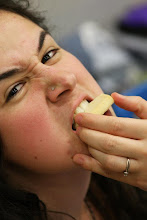Fictional characters are great. I love mythic heroes and villains, stories and fairytales give you a sense of wonder and make for excellent social commentary. That being said, I'm not sure how down I am with mythic characters that we encourage and trick children into believing they exist. I am begining to see a fine, but important line in all of this though- it's all about parental intent.
I find the tooth fairy to be innocuous. In the beginning it helps a child deal with what is rather frightening and strange - your bones are falling out of your mouth, that is enough to scar the crap out of anyone, especially a little kid. At six, finding a quarter under your pillow is pretty much the coolest thing ever. After a few teeth, you figure it out and maybe start negotiating a better exchange rate with Mom and Dad, it's a game. By making the event special and by reinforcing the 'growing-up' aspects of tooth loss and the responsibility of money, parents can alleviates fears and instill budding capitalist individuality that is in many ways required for success in middle-class America.
I guess Santa Claus and the Boogey Man started out as ways of bribing and scaring children into good behavior. The boogey man has largely fallen out of favor - not worth the psych bills for PTSD in later life. But Santa has thrived.
I was never taught to believe in Santa Claus. We received seven small and useful gifts from my parents, one each night of Hanukah, and then at the big family party (nicknamed the Family Present Orgy) we would get one bigger present. Small presents were usually socks and underwear, sometimes books, during my tween years I was sure to get at least one set of burt's bees chapsticks. Big presents were often less practical, a new CD player or jewelry (in Persian culture, a man's masculinity is partially wrapped up in the ornamentation of his daughters, mentally and physically, my getting a degree and having a good set of pearls is my dad's version of owning a motorcycle). Consumerism is rampant, but at least in our family, we accepted it at face-value.
Santa Claus seems to have been co-opted by a generation of children whose parents bought them stuff to show them love or neglected to buy them stuff or show them love, who want to coddle their children and relive their childhoods. Worse, Santa has been honed by generations of marketing wizzes to represent everything crass and commercial about the winter holidays. Boybee's first step in realizing that Jesus was a fairytale was realizing that Santa was a fairytale - not exactly his parent's intent. There is a joy in having presents 'miraculously' appear over night, but that's about all the magic there is in it. I can't count on all of my appendages the number of stupid Santa movies that come out every single year, and come on, kids aren't that dumb. I see Santa as being a problem, while being fine with the Tooth Fairy mainly because, when a kids figures out that the Tooth Fairy isn't real it can stay playful and fun and the parents can be in on the game, when a kid finds out that Santa isn't real it seems so traumatic with parents refusing to admit the truth... it's all creepy from an outsiders perspective. Both represent and encourage aspects of Capitalism, both require parents to sneak around and pretend that their actions are really those of a a ficgtious super-natural character, but the difference between the embracing a loss that signals growth (and a good venue to encourage savings) and the whole hearted embrace of consumption and encouraging a sense of entitlement seem very different to me.
Subscribe to:
Post Comments (Atom)

No comments:
Post a Comment